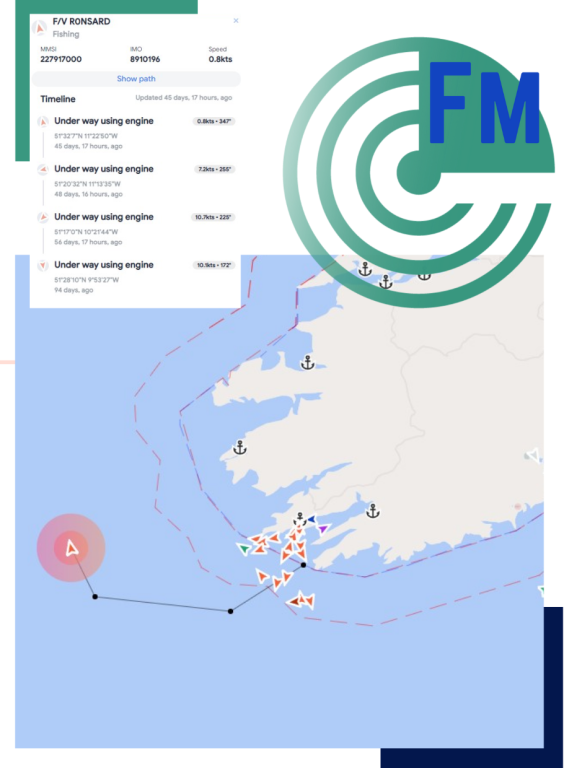UT Chattanooga's SimCenter helped to build out Dryad Global's Automated Risk Management Solution. Credit: Dryad Global

When Corey Ranslem and Frank Fenner founded International Maritime Security Associates to provide risk and threat information to vessels at sea, they knew that providing high-quality intelligence analysis and real-time information would be critical to their success.
To ensure safe and efficient operations, their clients — major cargo lines, cruise lines, yachts — turned to Ranslem and Fenner, former members of the U.S. Coast Guard and the U.S. Navy, respectively, to build route reports compiled from many sources about weather events, medical epidemics and disease outbreaks, piracy, migration, port delays, and other maritime security issues.
Ramslem envisioned all that data coming together in a software platform — like the Waze traffic app, but for ships at sea — supplemented by in-depth intelligence from the company’s network of analysts.
A RevV grant from the State of Tennessee brought Ranslem and the University of Tennessee Chattanooga’s SimCenter together to successfully solve the company’s complex data challenge.
RevV is a voucher program for Tennessee companies that offsets the costs of working with leading-edge experts in advanced research facilities to solve challenges in product development and process innovation. The State of Tennessee sponsors the program to ensure Tennessee companies maintain a competitive advantage in the global marketplace by providing access to expertise and facilities at Oak Ridge National Laboratory and the University of Tennessee.
The SimCenter, funded by the Tennessee Higher Education Commission, is UTC’s core facility for high-performance computing and storage and is designed to advance modeling- and simulation-based science. When Ranslem approached Anthony Skjellum, director of the SimCenter and a professor of computer science, about working together, Skjellum suggested applying to the RevV program.
“My mission is to enable our scientists and engineers to do computing to enhance the research and teaching, but also to bring the technology we’re capable of to the community. It’s a great example of how we can do community engagement,” Skjellum said. “It’s important to us to be the university for Chattanooga and that means helping Chattanooga to advance. Whenever possible, we need to engage in industrially relevant work, and RevV does that perfectly. It provides a straightforward way for us to engage and focus on doing our part really well.”
Skjellum served as the technical facilitator, bringing together a group of professors and students, and kept the project moving through milestones. The SimCenter team worked with Ranslem’s team on the first step in building the backend capabilities of the Automated Risk Management Solution, or ARMS, software to ingest thousands of sources and then correlate that data.
“We get incident reports that are false, misunderstood, or misreported,” Ranslem said. “We use other reports and other information to work through if something impactful has occurred.”
The team started by building the capability to correlate social media activity and weather events.
“We’ve found that by studying social media, whether that’s Twitter, Instagram or Facebook, if there’s an event happening somewhere in the world, it gets posted on those platforms first and then matriculates into other mainstream information sources,” Ranslem said.
With that piece built, the new underlying process could be used to integrate new data streams.
“We now have a way to manage big data and automate the back end. We can add more intelligence, more feeds, more information and continue to build it out,” Ranslem said.
About the time the project with the SimCenter was completed, Ranslem was approached by Dryad International with a merger offer.
“Dryad had a phenomenal global intelligence team and we now had software. In looking at our strengths and what our team had built with our customer-facing platform, our project with the SimCenter was something the company hadn’t seen before. The SimCenter project gives us a competitive advantage — that was really interesting and played a role in the merger,” Ranslem said.
In 2022, Ranslem’s company, International Maritime Security Associates, officially merged with Dryad International. The new company is called Dryad Global with Ranslem as chief executive officer of global operations. Dryad Global is based in London with a U.S. offices in Fort Lauderdale, Florida, and Chattanooga, Tennessee.
Dryad Global’s primary global technical operations and software development center in based in the Chattanooga office. Ranslem said the company purposefully selected Chattanooga for the operations center because the city offered the most cost-effective place in the world for the internet infrastructure required by a data-intense platform.
“If Chattanooga hadn’t been such a good place to site the operation, we wouldn’t have had the chance to meet Corey,” Skjellum said. “There’s a pull-through effect. RevV was a big deal. One of our graduates went on to work for Dryad Global. That could persuade other people to get their degree at UTC in computer science and go to work for a startup.”
Ranslem said the experience with ReV and UTC has been a great success for the company.
“Partnering with UTC allowed us access to exceptional talent to help us solve this big data problem. They helped us design a system that we can use to improve our data flow operations to our customers,” Ranslem said. “We’ve been able to hire more people in our Chattanooga operation and expand what we’re doing in Tennessee. It’s really cool to see our team grow.”


